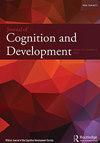语境和玩家评价对学龄前儿童社交行为和伙伴导向交际行为的影响
IF 2.1
2区 心理学
Q3 PSYCHOLOGY, DEVELOPMENTAL
引用次数: 0
摘要
摘要:为了成功地驾驭自己的社交世界,孩子们必须使自己的行为适应不同的情况,并以一种流动的方式来适应。目前的研究探讨了学龄前儿童在分配游戏资源时对游戏环境(合作/竞争)和来自另一个(虚构)玩家的信息(团队导向/自我导向)的敏感性。为了理解儿童在这些背景下的社会行为方式,我们关注这些因素是否影响1)儿童向其他玩家提供的资源数量和2)儿童对其他玩家的言语反应。儿童(4至6岁,N=118)首先对音频信息进行言语回应,然后完成资源分配任务。儿童的言语反应受到情境和其他参与者信息的影响;然而,在竞争环境中,玩家的信息影响更大。相比之下,儿童的资源分配主要受到环境的影响(在合作环境中更多地共享资源)。ToM较好的儿童在不同条件下的分配行为发生了更大的变化,特别是在合作环境中向其他参与者分配更多的项目。此外,在合作环境中,EF较好的儿童对另一名玩家产生了更多的亲社会评论。总之,研究结果强调了情境和人际因素与儿童亲社会行为认知技能之间的相互作用。本文章由计算机程序翻译,如有差异,请以英文原文为准。
The Influence of Context and Player Comments on Preschoolers’ Social and Partner-Directed Communicative Behavior
ABSTRACT To successfully navigate their social worlds, children must adapt their behaviors to diverse situations and do so in a fluid fashion. The current study explored preschool-aged children’s sensitivity to a gameplay context (cooperative/competitive) and messages from another (fictional) player (team-oriented/self-oriented) while distributing gameplay resources. To understand children’s approach to social behavior within these contexts, we focused on whether these factors affected 1) the number of resources children provided to the other player and 2) children’s verbal responses to other players. Children (4 to 6 years-old, N = 118) first provided verbal responses to audio messages, then completed a resource distribution task. Children’s verbal responses were influenced by both context and the other players’ messages; however, there was a greater influence of players’ messages in a competitive context. In contrast, children’s resource distributions were influenced primarily by the context (greater sharing of resources in the cooperative context). Children with better ToM showed a greater shift in their distributive behavior across conditions, specifically, distributing more items to the other players within a cooperative context relative to a competitive context. Also, within a cooperative context, children with better EF generated more prosocial comments for the other player. Together, the findings highlight the interplay between contextual and interpersonal factors with children’s cognitive skills for prosocial behavior.
求助全文
通过发布文献求助,成功后即可免费获取论文全文。
去求助
来源期刊

Journal of Cognition and Development
Multiple-
CiteScore
4.00
自引率
0.00%
发文量
29
期刊介绍:
The Journal of Cognition and Development is the official journal of the Cognitive Development Society (CDS). Some CDS members are concerned with basic research or theory; others focus on policy issues and practical applications. The range of interests includes cognitive development during all stages of life, and we seek to understand ontogenetic processes in both humans and nonhumans. Finally, their interests encompass typical as well as atypical development, and we attempt to characterize both biological and cultural influences on cognitive change and continuity.
 求助内容:
求助内容: 应助结果提醒方式:
应助结果提醒方式:


